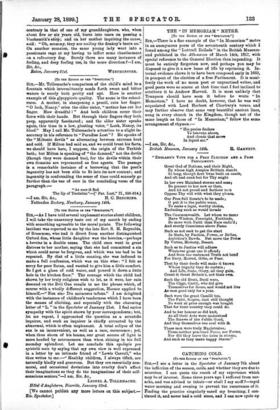[To THE EDITOR OF THY "Sritmtait.'1 Tollemache's comparison of the
child's mind to a fountain which intermittently sends forth sweet and bitter waters is surely both pretty and apt. Here is another example of this glycypicric quality. The scene is the school- room. A mother, in sharpening a pencil, cuts her finger. "0 look, Nancy," cries the elder sister, "mother has cut her finger. How dreadful " And both children cover their faces with their hands. But through their fingers they both peep, apparently fascinated ; and the elder sister speaks again, this time in a low, gloating voice, "Look, Nancy, its blood." May I call Mr. Tollemache's attention to a slight in- accuracy in his reference to "Paradise Lost" ? He speaks of the "Miltonie devils" as alternating between extreme heat and cold. If Milton had said so, and we could trust his facts, we should have here, I suppose, the origin of the Turkish bath; but Milton is speaking of "the damned," not the devils (though they were damned too), for the devils within their own domains are represented as free agents. The passage is a remarkable instance of a borrowing that the poet's ingenuity has not been able to fit into its new context; and ingenuity in confounding the sense of time could scarcely go further than the use of once in the concluding verse of the paragraph :— "As once it fled
The lip of Tantalus."—(" Par. Lost," II., 696-614.)


















































 Previous page
Previous page